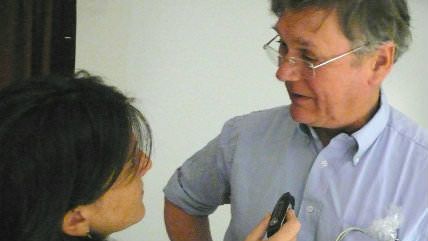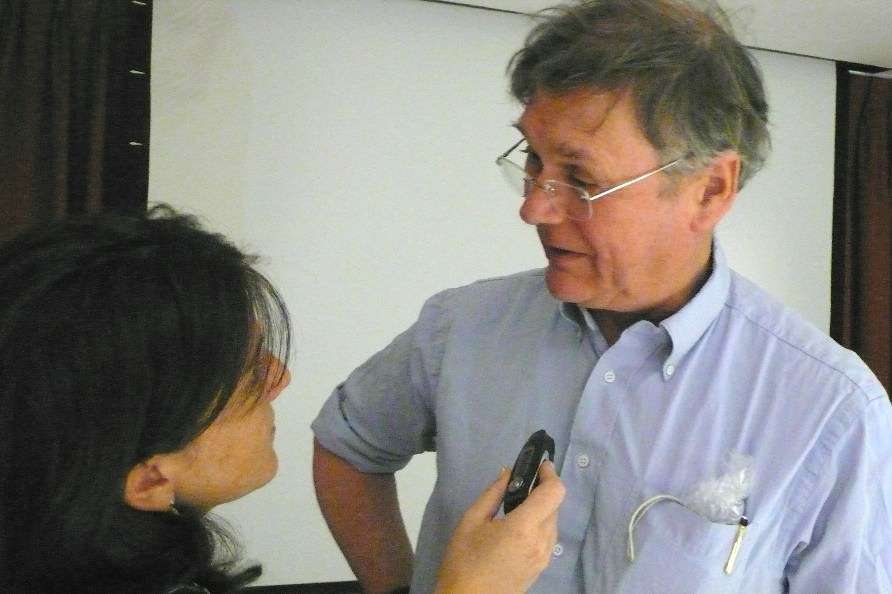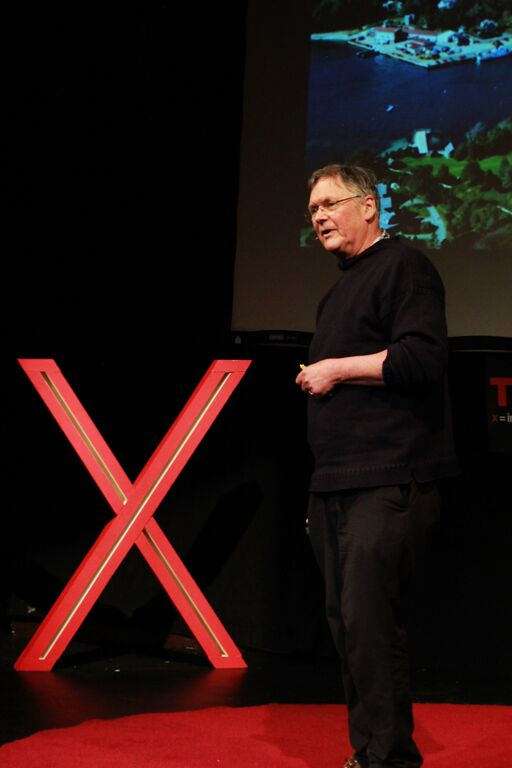'Sexist' Scientist Tim Hunt: The Real Story
The "Tim Hunt, misogynist scientist" narrative has been falling apart piece by piece over the past month.

Remember Tim Hunt, the Nobel Prize-winning British biochemist mocked and vilified on Twitter and in the media after he reportedly told a gathering of women scientists that "girls" in the lab are a nuisance because they are lovesick crybabies, and suggested sex-segregated labs as the solution? Remember how we were told that this shocking incident reveals still-entrenched sexism in the world of science? Well, now that the dust has cleared and the story has faded from the American press, there's a postscript that amounts to: Never mind. It turns out that, just as Hunt has claimed, the 72-year-old scientist's comments during a luncheon at a science journalism conference in Korea in June were an awkward self-deprecating joke—greeted with laughter (not the reported "stony silence") by a mostly female audience.
The "Tim Hunt, misogynist scientist" narrative has been falling apart piece by piece over the past month; last week, it was finished off by a snippet of audio recorded by a female attendee and made public by The Times. Attention should now tturn to the real scandal: irresponsible journalism magnified by social media frenzy.
It all started with a June 8 tweet from City University London journalism professor Connie St. Louis, lamenting that the luncheon at the World Conference of Science Journalists had been "ruined by sexist speaker Tim Hunt." According to St. Louis, Hunt announced that he had "a reputation as a male chauvinist" and continued, "Let me tell you about my trouble with girls. Three things happen when they are in the lab: you fall in love with them, they fall in love with you and when you criticize them they cry." Then, she wrote, he compounded it by advocating "single-sex labs" but adding that "he doesn't want to stand in the way of women."
Twitter exploded in outrage, and the story quickly got picked up by major media around the world, with such headlines as, "Nobel winner: Women in labs 'fall in love with you … you criticize them, they cry'" and "Sir Tim Hunt's sexist remarks: With lab rats like him, is it any wonder there's a shortage of women in science?" St. Louis's account, corroborated by two prominent American science journalists—former New York Times columnist Deborah Blum and Retraction Watch blogger Ivan Oransky—was roundly treated as fact. To make it worse, Hunt was said to have stood by his comments in an interview to BBC Radio even as he apologized for causing offense. It was not long before the story was updated with news of Hunt's resignation from his honorary post at University College London and from several prestigious science boards and committees.

Even after The Guardian ran a sympathetic interview with Hunt and his scientist wife Mary Collins, who defended him against charges of sexism—as did several other female scientists—most of the coverage stuck to the party line. Blum stepped in to rebut Hunt's assertion that he had been "hung out to dry" over an unfortunate joke; she claimed that she asked him the day after the luncheon if he had been joking, and that he simply reiterated his point ("he did think it was hard to collaborate with women because they are too emotional") and told her he had been "trying to be honest about the problems." St. Louis penned an essay for The Guardian portraying the sympathy for Hunt as "an outcry from the establishment" in a "typical pattern of oppression" and telling his supporters, "mainly men," to stop defending him.
That narrative took a major hit on June 24 when The Times obtained information that a European Commission report on the conference, based on the notes of a European Union official who attended the luncheon, gave a very different account of what happened. The report summarized Hunt's remarks as follows:
It's strange that such a chauvinist monster like me has been asked to speak to women scientists. Let me tell you about my trouble with girls. Three things happen when they are in the lab: you fall in love with them, they fall in love with you, and when you criticize them they cry. Perhaps we should make separate labs for boys and girls? Now seriously, I'm impressed by the economic development of Korea. And women scientists played, without doubt, an important role in it. Science needs women and you should do science despite all the obstacles, and despite monsters like me.
A follow-up article revealed that the EU official also said Hunt's remarks were well-received, contradicting his accusers' claims of an uncomfortable silence (or even a "deathly silence," as St. Louis told BBC Radio 4), and that one of the luncheon's organizers, a woman from the Korean National Research Council of Science and Technology, told him "she was impressed that Sir Tim could improvise such a warm and funny speech."
In the days that followed, this account was corroborated by several people who attended the luncheon. One of them, Russian science journalist Natalia Demina, had challenged the accusations against Hunt from the very start on Twitter. Another, Malaysian science journalist Shiow Chin Tan, provided a new detail: she told The Times that after his facetious comments about segregating the sexes, Hunt added that "men would be worse off for it." While St. Louis has continued to insist that Hunt did not say "now seriously" or praise women in science, Blum has acknowledged that the purported transcript had "some of the right elements" and was a "polished version" of Hunt's "somewhat fumbling actual talk."
What about Hunt's alleged admission to BBC Radio (and to Blum) that he was "just being honest" about the problems with women in science? Hunt has told The Guardian that his BBC "interview" was a hasty, clumsy statement recorded over the phone on his way home, in response to a text message asking for comment on the controversy of which he had been previously unaware. British newspaper columnist and politician Louise Mensch, one of Hunt's staunchest advocates, makes a strong case that his comments were misleadingly edited to obscure the fact that he was not referring to women scientists in general but to his own personal experience with romance in the lab and the resulting "emotional entanglements." (He met his wife in the laboratory while she was married to another man.) It's plausible that he said something similar to Blum the day after the luncheon; Kathryn O'Hara, the photographer who took their photo during that conversation, confirmed to me that she recalls Hunt saying he was trying to be honest about his own experiences.
Regardless, the new revelations turned the tide. By mid-July, Paul Nurse, the head of Britain's chief scientific body, the Royal Society, defended Hunt on BBC radio and in a letter to The Telegraph and blamed the fiasco on "a Twitter and media storm." The Guardian ran a semi-apology for its tendentious coverage. A scathing Times editorial blasted the "betrayal" of Hunt:
Thirty-nine words were lifted wholesale from their context by a partisan witness of questionable credentials. Bracketed by kneejerk outrage these words were tweeted round the world and used to destroy the reputation of a distinguished scientist on no solid ground at all.
But it still wasn't quite over. On July 18, The Times published a new bombshell: a 12-second recording of the final moments of Hunt's remarks that Demina had discovered among her materials from the conference and turned over to the newspaper with Mensch's help. In the audio, Hunt says, "Congratulations, everybody, because I hope—I hope—I really hope that there won't be anything holding you back, especially not monsters like me." There is a hearty laugh from the audience, followed by the start of applause before the recording breaks off.
The recording clearly dovetails with the EU official's notes provided to the European Commission. One can also see how, in St. Louis's retelling, Hunt's final line would turn into "he doesn't want to stand in the way of women." But in her version, the comment sounds insufferably patronizing, a pat on the head that compounds the earlier insult; in the audio, Hunt sounds warm, gracious, genuinely supportive and self-deprecating, not mocking toward women. In other words, this is a resounding vindication for Hunt—one that, unfortunately, may not undo the damage.
While claims that Hunt's career has been ruined are somewhat exaggerated—he is retired, his position at UCL a non-paying honorary one, and he is still affiliated with the Crick Institute where he does actual research—there is no question that his reputation and his ability to work for science have suffered. Speaking to The Guardian in mid-June, Hunt said that the worst blow was being forced to resign from the science committee of the European Research Council, to which he had devoted years of effort. More recently, Hunt's invitation to speak at a conference of the Italian Society of Anatomy and Histology in Ferrara was withdrawn as a precautionary measure, apparently due to threats of disruption from activists.
This is particularly shameful given that Hunt is not only a great scientist but, by many accounts, a genuine friend to women in science. There are numerous testimonials from women describing him as a caring and inspirational mentor, one who never treated his female students and colleagues differently from their male peers and has aided in their advancement. European Research Council president Jean-Pierre Bourguignon is on record as saying that Hunt "actively supported" the Council's initiatives to support women in science. The only charge of sexism anyone has tried to pin on him beyond his ill-considered remarks in Seoul is a 2014 interview in which he dared to suggest that the numerical disparities between men and women in science are not necessarily a huge problem. But this hardly means, as fellow UCL scientist David Colquhoun has insinuated on his blog, that Hunt also seriously believes women shouldn't work in science alongside men. (Ironically, as Mensch has discovered, Colquhoun himself had to field accusations of sexism on Twitter only a few months ago after voicing the heretical opinions that the paucity of women in senior scientific positions was due to different family roles, not sexism in academe.)
A few days before the disclosure of the case-clinching audio, science ethicist Janet Stemwedel wrote a piece for Forbes.com titled "What If Tim Hunt Had Done It Differently?" (While the column was written after the leak of the European Commission report, Stemwedel still quotes only the portion of Hunt's remarks originally reported by St. Louis.) There is no question that Hunt made his share of mistakes; for instance, Stemwedel is correct that he should have waited to get home and assess the situation before giving a statement to the BBC. But it's hard to tell if that would have helped: the media storm was already raging in his absence, and it's unlikely that even a more measured statement would have calmed it down.

Stemwedel does briefly ponder the question of what would have happened if St. Louis, Blum, and Oransky had not gone public about Hunt's comments. She concludes that this might have set a bad precedent for journalists "doing public relations rather than reporting." But a better question is: What if they had reported the story accurately?
And here's the answer: There would have been no story to report. If an accurate account of the luncheon and of Hunt's remarks had appeared in a general report on the conference, his joke would probably have offended a few of the Sisters of Perpetual Grievance. But it's unlikely that the outrage would have spread far and wide.
In her latest blogpost on the Hunt scandal, Mensch catalogues numerous misleading, contradictory, and self-contradictory statements by Hunt's accusers, suggesting that they have been knowingly dishonest. This is an extremely serious charge that is difficult to prove or disprove—it is just as possible that they simply saw the events through the filter of their own biases. A deliberate conspiracy to frame an innocent scientist for misogyny seems far-fetched; more likely, St. Louis ad her allies were genuinely offended by Hunt's remark about his "trouble with girls," allowed their offended sensibilities to color their perception of the rest of his comments, and ran with what they thought was a bombshell of a story.
If nothing else, they demonstrated incredible sloppiness. For instance, St. Louis misinterpreted a tweet by Australian technology developer Scott Watkins as meaning that Hunt had also thanked the women who hosted the event for "making lunch." Watkins later corrected that misimpression, pointing out that it was a Korean female politician who had "thanked the ladies for the lunch." But St. Louis was on a roll in her interviews, transforming Hunt's nonexistent quote first into "I hope the women have prepared the lunch," then into "He stood up, declared that the woman had probably prepared the lunch 'cause that was their role…" One starts to wonder if St. Louis actually convinced herself she heard this remark; she reportedly insisted that Hunt thanked the women for lunch even after this claim was retracted by several publications. (It should be noted that St. Louis has been accused by The Daily Mail of inflating her accomplishments in the curriculum vitae posted on her faculty page. City University has stood by her, and her defenders say that the school simply "uploaded an outdated CV into its information system.")
Blum's conduct raises many questions as well. For instance, after repeatedly and strongly insisting that Hunt had confirmed he was serious about segregated labs—and even saying that she "was hoping he'd say it had been a joke" when she spoke to him the day after—she apparently shifted her position, tweeting and endorsing the view that even as a joke, his remarks were unacceptable and "awful." Moreover, while Blum has presented her next-day conversation with Hunt as an effort to give him a chance to explain himself, she did not approach him until after St. Louis had, by their mutual agreement, sent out her accusatory tweet. Nor did she record the conversation or take notes immediately after it.
Of course, the rest of the media and the commentariat did little better in their rush to judgment. No one bothered to ask how plausible it was that a scientist who had worked with women and was married to a prominent female scientist actually believed women should be relegated to their own all-girl labs—and would stand up and say that to a roomful of female scientists and journalists. The "sexist scientist" narrative was too good. As Guardian commentator Ann Perkins wrote with open glee, "The mask has not so much slipped as crashed to the floor. … Here at last is someone who has come out with it. Women at work are a nuisance." Jarringly, Perkins called this "a moment to savor"—not, as some thought, because of Hunt's humiliation, but because he had supposedly laid bare the pervasive hidden misogyny women face.
In a more recent Forbes column, science writer David Kroll wrote about a European Research Council grant recipient, Debra Laefer of University College Dublin, who presented her pioneering research on architectural restoration techniques at a session Hunt chaired at the Seoul conference. Kroll expressed regret that the Hunt scandal overshadowed Laefer's remarkable work. A shame, indeed. That's what happens when the feminist mainstream is less interested in celebrating real female achievement than in railing against imaginary male chauvinism.
